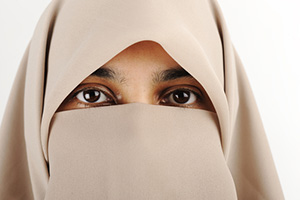
Canada's Office of Religious Freedom will not discuss legislation that opponents say threatens religious freedom at home.
A request to interview office ambassador Andrew Bennett about a potential ban on face coverings at citizenship ceremonies was denied by the Department of Foreign Affairs, Trade and Development, which handles communications for the office.
Multiculturalism Minister Tim Uppal told reporters in Ottawa last week that the Conservatives plan to introduce the bill banning face coverings before the current session of the House wraps up.
That same week, Immigration Minister Chris Alexander caused an uproar when he answered a question from Vice News about such bans, responding that Canadians "don't want their co-citizens to be terrorists."
The legislation would affect Muslim women who wear the niqab, a religious garment that covers the face. A ban on wearing the niqab at such ceremonies was already overturned by a Federal Court judge in February.
The Foreign Affairs Ministry denied The Tyee a chance to ask Bennett his thoughts on such legislation should it be tabled, reasoning that his office is concentrated on religious freedom outside of Canada.
"The Office of Religious Freedom's mandate is to advance religious freedom overseas as part of Canada's principled foreign policy," read the email from spokesperson Amy Mills.
Office deals with serious infractions
It turns out that federal New Democrat Paul Dewar got a similar response from Bennett himself when he wrote a letter to the ambassador regarding the issue.
Dewar, the NDP's foreign affairs critic, asked Bennett in a March 2 letter what actions his office had taken to defend people's right to religious expression through clothing.
"Does the government of Canada consider the peaceful public display of material articles of faith, including wearing religious clothing such as the Jewish yarmulke, the Muslim hijab, or the Sikh turban to be an essential component of religious freedom and expression?" Dewar asked.
Bennett replied his office was established to deal with more serious infractions on religious freedom.
"Our efforts are focused on areas where there is evidence of egregious violations of freedom of religion or belief," Bennett replied. "These violations include, but are not limited to: targeted killings or beheadings, acts of mob violence, and the destruction of places of worship and holy sites."
But the office has in the past commented on more minor issues of religious freedom.
In a speech given in Washington, D.C. on April 18, 2013, two months after Bennett was first appointed, he said that legislative restrictions on religion were a growing concern worldwide.
"Many religious groups face unfair legislative and regulatory restrictions that can strip away fundamental democratic freedoms," he said, referencing the loss of voting rights.
"These restrictions placed on religious groups under the guise of maintaining order and security undermine basic dignity and certainly the human rights of too many around the world."
Office spending revealed
Documents obtained through access to information law earlier this year show that since its 2013 inception, the Office of Religious Freedom has spent $7.6 million on independent initiatives abroad, including projects in Poland, Pakistan, Nigeria, Indonesia, Sri Lanka, China and Ukraine, and with the Organization for Security and Cooperation in Europe.
In the same request, The Tyee received a copy of an application for funding from the Catholic Near East Welfare Association for $240,000 for programs in Ukraine.
The project, which was approved, brings together hundreds of people for summer youth leadership programs, seminars and other initiatives that focus on cooperation between religious groups in the country.
The application showed the project aims to "raise awareness about issues related to freedom of religion or belief by providing support for multicultural organizations for their activities, including inter-religious dialogue and education on religious tolerance, freedom of religion or belief and pluralism."
The project is also meant to foster relations between East and West Ukraine through the promotion of religious freedom, and to facilitate discussion around public policy, the environment, the economy and the role of churches in the country.
One of the human rights concerns laid out in the project application was "negative trends towards increased state regulation and limitation of religious freedom." ![]()














Tyee Commenting Guidelines
Comments that violate guidelines risk being deleted, and violations may result in a temporary or permanent user ban. Maintain the spirit of good conversation to stay in the discussion.
*Please note The Tyee is not a forum for spreading misinformation about COVID-19, denying its existence or minimizing its risk to public health.
Do:
Do not: